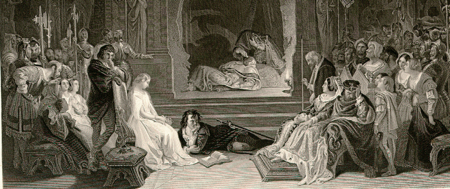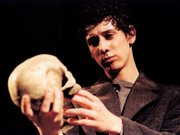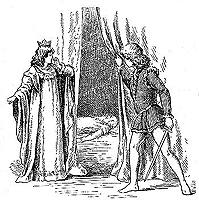
- The Tragedies - The Comedies - The Histories - The Sonnets
- The Life of Shakespeare - The Times of William Shakespeare - The Characters from Shakespeare - Stories and Plots
- Shakespeare Quotes - Doubtful Works - Site Map - More ...
Hamlet
In theatre,Hamlet is possibly the most often produced work in almostevery western country and it is considered a crucial test formature actors (somewhatunfortunately, since Hamlet is supposed to be a young man).Hamlet's "To be, or not to be" soliloquy (Act Three, SceneOne), the most popular passage of the play, is so well known thatit has become a stumbling-block for many modern actors.  The play-within-the-play scene, 1875-1876.
[edit] Main characters British stage actor AlWeaver as the lead in Trevor Nunn's 2004 production of Hamletat the Old Vic in London. Here Hamlet contemplates the skull ofYorick in the famed "Gravedigger Scene." Prince Hamlet, the title character, is the son ofthe late King of Denmark, who was also named Hamlet. He is chargedby the ghost of his father to avenge his murder, which he finallysucceeds in doing, but only after the rest of the royal house hasbeen wiped out and he himself has been mortally wounded with apoisoned rapier byLaertes. Claudius is the current King of Denmark,Hamlet's uncle, who succeeded to the throne upon the death of hisbrother. The ghost of King Hamlet tells Prince Hamlet that he wasmurdered by brother Claudius, who poured hebenon in his ear while he was asleep.Claudius is killed with a poisoned rapier by Hamlet who, for goodmeasure, also forces him to drink the wine with which he hadintended to poison Hamlet. KingHamlet (Ghost) was Hamlet's father. At the start ofthe play, he is not long dead. He appears to Hamlet as a ghost andurges him to avenge his murder. He is referred to in the stagedirection as Ghost. King Hamlet was killed by poison emptiedinto one of his ears. Gertrude is Hamlet's mother, thewidow of King Hamlet who became the wife of Claudius, arelationship considered incestuous in Shakespeare's time. She dies by drinkingpoisoned wine intended for Hamlet. Polonius isClaudius's chief councillor, who is distrustful of Hamlet'srelationship with Ophelia. He is a fatuous bore, and Hamletfrequently teases him while pretending to be mentally unbalanced.He is fatally stabbed by Hamlet while hidden behind an arras whiletrying to eavesdrop upon a conversation between Hamlet and hismother. Laertes is Polonius' son, who killsHamlet with a poisoned rapier to avenge the deaths of Polonius and Ophelia.He is killed by Hamlet with the same rapier, although at the timeHamlet did not realise it was poisoned. Ophelia is Polonius' daughter. Sheand Hamlet have had romantic feelings for each other, although sheand Hamlet (at least implicitly) have been warned that it would bepolitically inexpedient for them to marry. Jilted by Hamlet as partof his insanity ruse, her father's death causes her to actually goinsane, and she drowns herself, possibly accidentally. Horatio is a friend ofHamlet's from university. He is not directly involved in theintrigue among the royals, which enables the author to use him as afoil or sounding board for Hamlet. He is the most importantcharacter alive at the end of the play, though he threatens tocommit suicide. Rosencrantz and Guildenstern areold school-fellows of Hamlet, who were summoned to the castle byClaudius to keep a watch on Hamlet. Hamlet soon suspects that theyare spies. Though their roles in the play are relatively minor,Tom Stoppardcreated a popular play and movie Rosencrantz andGuildenstern are Dead in which the two title characterscontemplate their roles as minor players in a bigger drama. Theydie off-stage in England, executed by the King's warrant forHamlet's death, altered by Hamlet to name them. Fortinbras is the Norwegiancrown prince who has only a couple of brief scenes in the play, butwho delivers its final lines and appears to represent the hope fora better future for the Danish monarchy and its subjects. [edit] Plot summaryThe play concerns the dilemma of Prince Hamlet, whose father,the erstwhile King of Denmark, died suddenly while Hamlet was away atuniversity. The King's brother Claudius had himself proclaimedking, and cemented his claim to the throne by marrying Hamlet'smother Gertrude, the widowed Queen. Hamlet expresses his anger at the accession of his uncleClaudius and particularly with his mother's hasty remarriage.Hamlet soon encounters the ghost of his dead father, who informshim that he was murdered by Claudius, and commands Hamlet to avengehim. Hamlet then decides to put on an "antic disposition" (actinsane) in order to kill Claudius, but Hamlet is unsure whether theghost he has seen is truly his father, and suspects that it mightbe the devil taking his father's appearance in order to causehavoc. He therefore sets out to test the king's conscience throughfeigning insanity, and by enlisting a traveling company to stage aplay he has written re-enacting the circumstances of themurder. The play's the thingWherein I'll catch the conscience of the King. (Act II, scene II) The king's outrageous reaction to the performance convincesHamlet of his guilt. Shortly afterwards, Claudius privatelyexpresses his disgust at what he has done, and offers up a prayerof repentance. Hamlet discovers him at prayer, and prepares to killhim, but then stops, reasoning that he does not want his revenge tohave the result of sending the repentant Claudius to heaven. In adouble irony, after Hamlet slips away, Claudius concludes that heis unable to repent in his current state of mind; thus, if Hamlethad not attempted to arrogate to himself the destiny of Claudius'ssoul, rather than just his life, he would have gotten the ultimatejustice he sought. Hamlet confronts his mother about the murder of his father andher sexual relations with her new husband, and during theirconversation, he stabs Polonius, the king's councillor, who hasbeen hiding behind a tapestry, thinking it may have been the King.King Hamlet's ghost makes a reappearance to chastise Hamlet forabusing his mother. The king, who has realised that Hamlet knowsabout the murder he committed, sends Hamlet to England with amessage to the English ordering his death. On the way to England,Hamlet's ship is attacked by pirates, who take Hamlet prisoner butthen return him to Denmark. Meanwhile, Hamlet's romantic partner Ophelia goes mad, havingbeen already disturbed by Hamlet's feigned rejection of her, and bythe death of Polonius, her father. In what may have been a suicideattempt, she falls into a river and drowns. Hamlet, returning fromhis voyage, meets Horatio in a graveyard outside Elsinore just as Ophelia'sfuneral cortege arrives there. Hamlet finds the skullof Yorick, and proclaims of it, "Here hung those lips that I havekissed I know not how oft." Laertes, son of Polonius and brother of Ophelia, who is standingin an open grave when Hamlet lands on top of him, is determined tokill Hamlet in revenge for the havoc that has been wreaked on hisfamily. He and Claudius engineer a scheme to kill Hamlet whilemaking the death look like an accident. To this end, Claudiusinstructs Laertes to challenge Hamlet to a fencing match. Unknownto Hamlet, Laertes will be fighting with a sharpened and poisonedfoil, instead of the customary blunted blade. In addition, Claudiusprepares some poisoned wine for Hamlet to drink as a toast, in theevent that Laertes is unable to hit him. After Hamlet wins the first two rounds of the match, Gertrudeinadvertently drinks the poisoned wine. Hamlet is pricked with thesword and fatally poisoned, but in the ensuing brawl, he swapsblades with Laertes, and deals a deep wound to Laertes with thepoisoned sword. Laertes dies from the poison, and in his dyingbreaths, Laertes confesses the whole plot to Hamlet. Enraged,Hamlet kills Claudius with the poisoned weapon, finally avenginghis father's death. Horatio, horrified at the turn of events, seizes the poisonedwine and proposes to join his friend in death, but Hamlet wrestlesthe cup away from him and orders him to tell the true story of theroyal family's troubles to the world at large, thus restoringHamlet's good name. Hamlet also recommends that the Norwegianprince, Fortinbras, be chosen as the rightful successor to theDanish throne. Hamlet dies, and Horatio mourns his passing: Good night sweet prince: And flights of angels sing thee to thy rest! (Act V, scene II) [edit] HistoryHamlet, or Amleth, was a legendary Danish prince (see: Hamlet(legend)) whose exploits were recorded by SaxoGrammaticus in his Gesta Danorum around 1200 AD; Francois de Belleforestadapted Saxo's story in his Histoires tragiques (1570).Shakespeare's main source, however, is believed to be an earlierplay about Hamlet (the Ur-Hamlet), which is attributed to Thomas Kyd and is knownto have introduced a ghost to the story. Some scholars, however,believe that the Ur-Hamlet may have been written by Shakespearehimself. Shakespeare may also have taken some elements from Kyd'sother play, The Spanish Tragedy, especially the hero'sprocrastination. [edit] Hamlet as a characterHamlet is possibly the most discussed and contentious characterin the whole of world dramaand indeed in the whole of Western literature. While concedinghe is one of Shakespeare's greatest creations, critics are atloggerheads over the inner motivations and psyche of this character. His relationships withthe various characters of the story, including his father, hisuncle Claudius, his mother Gertrude and his beloved Ophelia, haveall been subjected to multiple speculations, including modernpsychologicaltheories. Critics as varied as Goethe, Coleridge, Hegel, Nietzsche, Turgenev, Freud, T. S. Eliot, and Asimov have written essays on him, allwith their own special insights. Besides being Shakespeare's mostdemanding role (with over 1,400 lines), Hamlet is also the mostintrospective. Actors have traditionally struggled with this role,and it can be safely said that any one performance can only capturesome facets of the creation. The plot summary above presents the simplest view of Hamlet, asa person seeking truth in order to be certain that he is justifiedin carrying out the revenge called for by a ghost that claims to bethe spirit of his father. The most standard view is that Hamlet ishighly indecisive. The 1948movie with Laurence Olivier in the title role,considered by many a standard, is introduced by a voiceover: "Thisis a story of a man who could not make up his mind." Others see Hamlet as a person charged to carry out a duty thathe both knows and feels he must do, yet doesn't want to. In thisview all of his efforts to satisfy himself of King Claudius' guiltor his failure to act when he can are evidence of thisunwillingness, and Hamlet berates himself for his inability tocarry out his task. After observing a play-actor performing ascene, he notes that the actor was moved to tears in the passion ofthe story and compares this passion for a fictional character,Hecuba, in light of his own situation: O, what a rogue and peasant slave am I!Is it not monstrous that this player here,But in a fiction, in a dream of passion,Could force his soul so to his own conceitThat from her working all his visage wan'd;Tears in his eyes, distraction in's aspect,A broken voice, and his whole function suitingWith forms to his conceit? And all for nothing!For Hecuba?What's Hecuba to him, or he to Hecuba,That he should weep for her? [...] And he acknowledges to himself the terrible deed he must avenge,yet responds only with words: Yet I,A dull and muddy-mettled rascal, peak,Like John-a-dreams, unpregnant of my cause,And can say nothing; no, not for a kingUpon whose property and most dear lifeA damn'd defeat was made. Am I a coward? [...]But I am pigeon-liver'd, and lack gall [...]Why, what an ass am I! This is most brave,That I, the son of a dear father murder'd,Prompted to my revenge by heaven and hell,Must, like a whore, unpack my heart with words [Act II, sc. ii] Hamlet's verbose and painful analyses of his situation andactions encourage many others to see his struggle as something farmore existential in nature, having less to do with the revengedrama than with the human condition. The time is out of joint: Oh cursed spite, That ever I was born to set it right. [Act I, sc. v] Another view of Hamlet, advanced by Isaac Asimov in his Guide toShakespeare, holds that his actions are attributable not toindecision, but to multiple motivations: his desire to avenge thewrong done to his father, coupled with his own ambition to succeedto the throne. The tragic error committed by Hamlet, in Asimov'sview, is his overreaching wish to see Claudius damned, and notmerely dead, which prevents him from killing Claudius at theopportune moment. [edit] Hamlet in cinemaAccording to the Internet Movie Database there havebeen 22 theatrical movies(http://us.imdb.com/Tsearch?title=hamlet&restrict=Movies+and+TV)with the simple title Hamlet plus another 16 with that titlethat were made for TV. Another 50 productions have included thisname as part of the title or have used a foreign language variationof the name. The first such movie, Le Duel d'Hamlet, was produced anddirected by Clément Maurice in France in 1900, andstarred Sarah Bernhardt (reprising her stage role) asHamlet. Pierre Magnier playedLaertes. 1948: Hamlet, directed by LaurenceOlivier
1960: Hamlet,directed by Franz Peter Wirth
1969: Hamlet, directed byTonyRichardson
1990: Hamlet, directed by FrancoZeffirelli
1996: Hamlet, directed by KennethBranagh
2000: Hamlet, directed by Michael Almereyda
A number of films have also used lines from Hamlet's soliloquyas film titles. Retrieved from "http://en.wikipedia.org/wiki/William_Shakespeare" All text is availableunder the terms of the GNU Free Documentation License |
All Shakespeare |
Our Sponsors
-
- Study Guide - About Us- Privacy Policy - Site Map - Other Languages - Links - Link Exchange - More ...

![[advertisement]](ban10.gif)